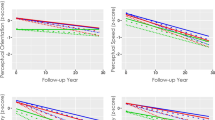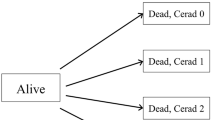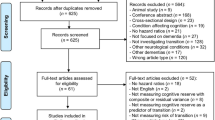Abstract
The aim of this study was to evaluate the effect of cognitive reserve (CR), in progression from subjective cognitive decline (SCD) to mild cognitive impairment (MCI) and Alzheimer’s disease (AD). For this purpose, we followed up 263 patients (154 SCD; 109 MCI) for a mean time of 7 years. CR was assessed by the Test di Intelligenza Breve (TIB), functionally equivalent to the National Adult Reading Test. High CR resulted as a protective factor for progression from SCD to MCI. Age at conversion to MCI was delayed 9 years on average in SCD with high CR with respect to SCD with low CR. On the contrary, high CR resulted as a risk factor for progression from MCI to AD dementia only in APOE ε4 carriers. Conversion time from MCI to AD dementia was 3 years shorter in ε4 carriers with high CR than subjects with low CR and ε4 non-carriers with high CR. Consistent with the CR hypothesis, our results showed that higher levels of CR protect against the earliest clinical manifestations of AD. In line with the previous researches, we found an interaction between CR and APOE in progression from MCI to AD dementia.



Similar content being viewed by others
Abbreviations
- CR:
-
Cognitive reserve
- SCD:
-
Subjective cognitive decline
- TIB:
-
Test di Intelligenza Breve
- HDRS:
-
Hamilton Depression Rating Scale
- NART:
-
National adult reading test
References
Stern Y (2009) Cognitive reserve. Neuropsychologia 47:2015–2028. https://doi.org/10.1016/j.neuropsychologia.2009.03.004
Stern Y, Gurland B, Tatemichi TK, Tang MX, Wilder D, Mayeux R (1994) Influence of education and occupation on the incidence of Alzheimer’s disease. JAMA 271:1004–1010
Bessi V, Mazzeo S, Padiglioni S, Piccini C, Nacmias B, Sorbi S, Bracco L (2018) From subjective cognitive decline to Alzheimer’s disease: the predictive role of neuropsychological assessment, personality traits, and cognitive reserve. A 7-year follow-up study. J Alzheimers Dis JAD. https://doi.org/10.3233/JAD-171180
Stern Y (2002) What is cognitive reserve? Theory and research application of the reserve concept. J Int Neuropsychol Soc JINS 8:448–460
Cecchetti L, Ricciardi E, Volpi L, Carlesi C, Pagni C, Handjaras G, Leo A, Tognoni G, Pietrini P (2013) Cognitive reserve modulates neural responses in subjective and mild cognitive impairment. Alzheimers Dement J Alzheimers Assoc 9:P490. https://doi.org/10.1016/j.jalz.2013.05.1003
Garibotto V, Borroni B, Sorbi S, Cappa SF, Padovani A, Perani D (2012) Education and occupation provide reserve in both ApoE ε4 carrier and noncarrier patients with probable Alzheimer’s disease. Neurol Sci Off J Ital Neurol Soc Ital Soc Clin Neurophysiol 33:1037–1042. https://doi.org/10.1007/s10072-011-0889-5
Franzmeier N, Hartmann JC, Taylor ANW, Araque Caballero M, Simon-Vermot L, Buerger K, Kambeitz-Ilankovic LM, Ertl-Wagner B, Mueller C, Catak C, Janowitz D, Stahl R, Dichgans M, Duering M, Ewers M (2017) Left frontal hub connectivity during memory performance supports reserve in aging and mild cognitive impairment. J Alzheimers Dis JAD 59:1381–1392. https://doi.org/10.3233/JAD-170360
Jones RN, Manly J, Glymour MM, Rentz DM, Jefferson AL, Stern Y (2011) Conceptual and measurement challenges in research on cognitive reserve. J Int Neuropsychol Soc JINS 17:593–601. https://doi.org/10.1017/S1355617710001748
Stern Y, Alexander GE, Prohovnik I, Mayeux R (1992) Inverse relationship between education and parietotemporal perfusion deficit in Alzheimer’s disease. Ann Neurol 32:371–375. https://doi.org/10.1002/ana.410320311
Scarmeas N, Levy G, Tang M-X, Manly J, Stern Y (2001) Influence of leisure activity on the incidence of Alzheimer’s disease. Neurology 57:2236–2242
Park DC, Lautenschlager G, Hedden T, Davidson NS, Smith AD, Smith PK (2002) Models of visuospatial and verbal memory across the adult life span. Psychol Aging 17:299–320
Wisdom NM, Mignogna J, Collins RL (2012) Variability in Wechsler Adult Intelligence Scale-IV subtest performance across age. Arch Clin Neuropsychol Off J Natl Acad Neuropsychol 27:389–397. https://doi.org/10.1093/arclin/acs041
Jessen F, Amariglio RE, van Boxtel M, Breteler M, Ceccaldi M, Chételat G, Dubois B, Dufouil C, Ellis KA, van der Flier WM, Glodzik L, van Harten AC, de Leon MJ, McHugh P, Mielke MM, Molinuevo JL, Mosconi L, Osorio RS, Perrotin A, Petersen RC, Rabin LA, Rami L, Reisberg B, Rentz DM, Sachdev PS, de la Sayette V, Saykin AJ, Scheltens P, Shulman MB, Slavin MJ, Sperling RA, Stewart R, Uspenskaya O, Vellas B, Visser PJ, Wagner M (2014) A conceptual framework for research on subjective cognitive decline in preclinical Alzheimer’s disease. Alzheimers Dement J Alzheimers Assoc 10:844–852. https://doi.org/10.1016/j.jalz.2014.01.001
Petersen RC (2004) Mild cognitive impairment as a diagnostic entity. J Intern Med 256:183–194. https://doi.org/10.1111/j.1365-2796.2004.01388.x
Albert MS, DeKosky ST, Dickson D, Dubois B, Feldman HH, Fox NC, Gamst A, Holtzman DM, Jagust WJ, Petersen RC, Snyder PJ, Carrillo MC, Thies B, Phelps CH (2011) The diagnosis of mild cognitive impairment due to Alzheimer’s disease: recommendations from the National Institute on Aging-Alzheimer’s Association workgroups on diagnostic guidelines for Alzheimer’s disease. Alzheimers Dement J Alzheimers Assoc 7:270–279. https://doi.org/10.1016/j.jalz.2011.03.008
Reisberg B, Gauthier S (2008) Current evidence for subjective cognitive impairment (SCI) as the pre-mild cognitive impairment (MCI) stage of subsequently manifest Alzheimer’s disease. Int Psychogeriatr 20:1–16. https://doi.org/10.1017/S1041610207006412
Mitchell AJ (2008) Is it time to separate subjective cognitive complaints from the diagnosis of mild cognitive impairment? Age Ageing 37:497–499. https://doi.org/10.1093/ageing/afn147
Mendonça MD, Alves L, Bugalho P (2016) From subjective cognitive complaints to dementia: who is at risk? A systematic review. Am J Alzheimers Dis Other Demen 31:105–114. https://doi.org/10.1177/1533317515592331
Lojo-Seoane C, Facal D, Guàrdia-Olmos J, Juncos-Rabadán O (2014) Structural model for estimating the influence of cognitive reserve on cognitive performance in adults with subjective memory complaints. Arch Clin Neuropsychol 29:245–255. https://doi.org/10.1093/arclin/acu007
Perquin M, Diederich N, Pastore J, Lair M-L, Stranges S, Vaillant M, Group on behalf of the M (2015) Prevalence of dementia and cognitive complaints in the context of high cognitive reserve: a population-based study. PLoS One 10:e0138818. https://doi.org/10.1371/journal.pone.0138818
João AA, Maroco J, Ginó S, Mendes T, Mendonça A de, Martins IP (2015) Education modifies the type of subjective memory complaints in older people. Int J Geriatr Psychiatry 31:153–160. https://doi.org/10.1002/gps.4305
Lenehan ME, Summers MJ, Saunders NL, Summers JJ, Vickers JC (2015) Relationship between education and age-related cognitive decline: a review of recent research. Psychogeriatrics 15:154–162. https://doi.org/10.1111/psyg.12083
Soldan A, Pettigrew C, Cai Q, Wang J, Wang M-C, Moghekar A, Miller MI, Albert M, BIOCARD Research Team (2017) Cognitive reserve and long-term change in cognition in aging and preclinical Alzheimer’s disease. Neurobiol Aging 60:164–172. https://doi.org/10.1016/j.neurobiolaging.2017.09.002
Lojo-Seoane C, Facal D, Guàrdia-Olmos J, Pereiro AX, Juncos-Rabadán O (2018) Effects of cognitive reserve on cognitive performance in a follow-up study in older adults with subjective cognitive complaints. The role of working memory. Front Aging Neurosci 10:189. https://doi.org/10.3389/fnagi.2018.00189
Aghjayan SL, Buckley RF, Vannini P, Rentz DM, Jackson JD, Sperling RA, Johnson KA, Amariglio RE (2017) The influence of demographic factors on subjective cognitive concerns and beta-amyloid. Int Psychogeriatr 29:645–652. https://doi.org/10.1017/S1041610216001502
Rawle MJ, Davis D, Bendayan R, Wong A, Kuh D, Richards M (2018) Apolipoprotein-E (Apoe) ε4 and cognitive decline over the adult life course. Transl Psychiatry 8:18. https://doi.org/10.1038/s41398-017-0064-8
Caselli RJ, Dueck AC, Osborne D, Sabbagh MN, Connor DJ, Ahern GL, Baxter LC, Rapcsak SZ, Shi J, Woodruff BK, Locke DEC, Snyder CH, Alexander GE, Rademakers R, Reiman EM (2009) Longitudinal modeling of age-related memory decline and the APOE epsilon4 effect. N Engl J Med 361:255–263. https://doi.org/10.1056/NEJMoa0809437
Soldan A, Pettigrew C, Lu Y, Wang M-C, Selnes O, Albert M, Brown T, Ratnanather JT, Younes L, Miller MI, BIOCARD Research Team (2015) Relationship of medial temporal lobe atrophy, APOE genotype, and cognitive reserve in preclinical Alzheimer’s disease. Hum Brain Mapp 36:2826–2841. https://doi.org/10.1002/hbm.22810
Hong YJ, Yoon B, Shim YS, Kim S-O, Kim HJ, Choi SH, Jeong JH, Yoon SJ, Yang DW, Lee J-H (2015) Predictors of clinical progression of subjective memory impairment in elderly subjects: data from the clinical research centers for dementia of South Korea (CREDOS). Dement Geriatr Cogn Disord 40:158–165. https://doi.org/10.1159/000430807
Jessen F, Wolfsgruber S, Wiese B, Bickel H, Mösch E, Kaduszkiewicz H, Pentzek M, Riedel-Heller SG, Luck T, Fuchs A, Weyerer S, Werle J, van den Bussche H, Scherer M, Maier W, Wagner M, German Study on Aging, Cognition and Dementia in Primary Care Patients (2014) AD dementia risk in late MCI, in early MCI, and in subjective memory impairment. Alzheimers Dement J Alzheimers Assoc 10:76–83. https://doi.org/10.1016/j.jalz.2012.09.017
Kaup AR, Nettiksimmons J, Harris TB, Sink KM, Satterfield S, Metti AL, Ayonayon HN, Yaffe K (2015) Cognitive resilience to apolipoprotein E ε4: contributing factors in black and white older adults. JAMA Neurol 72:340–348. https://doi.org/10.1001/jamaneurol.2014.3978
López ME, Turrero A, Delgado ML, Rodríguez-Rojo IC, Arrazola J, Barabash A, Maestú F, Fernández A (2017) APOE ε4 genotype and cognitive reserve effects on the cognitive functioning of healthy elders. Dement Geriatr Cogn Disord 44:328–342. https://doi.org/10.1159/000481852
Carlson MC, Helms MJ, Steffens DC, Burke JR, Potter GG, Plassman BL (2008) Midlife activity predicts risk of dementia in older male twin pairs. Alzheimers Dement J Alzheimers Assoc 4:324–331. https://doi.org/10.1016/j.jalz.2008.07.002
Niti M, Yap K-B, Kua E-H, Tan C-H, Ng T-P (2008) Physical, social and productive leisure activities, cognitive decline and interaction with APOE-ε4 genotype Chinese older adults. Int Psychogeriatr 20:237–251. https://doi.org/10.1017/S1041610207006655
Wang H-X, Gustafson DR, Kivipelto M, Pedersen NL, Skoog I, Windblad B, Fratiglioni L (2012) Education halves the risk of dementia due to apolipoprotein ε4 allele: a collaborative study from the Swedish brain power initiative. Neurobiol Aging 33:1007.e1–1007.e7. https://doi.org/10.1016/j.neurobiolaging.2011.10.003
Pettigrew C, Soldan A, Li S, Lu Y, Wang M-C, Selnes OA, Moghekar A, O’Brien R, Albert M, The Biocard Research Team null (2013) Relationship of cognitive reserve and APOE status to the emergence of clinical symptoms in preclinical Alzheimer’s disease. Cogn Neurosci 4:136–142. https://doi.org/10.1080/17588928.2013.831820
Ferrari C, Lombardi G, Polito C, Lucidi G, Bagnoli S, Piaceri I, Nacmias B, Berti V, Rizzuto D, Fratiglioni L, Sorbi S (2018) Alzheimer’s disease progression: factors influencing cognitive decline. J Alzheimers Dis JAD 61:785–791. https://doi.org/10.3233/JAD-170665
Arenaza-Urquijo EM, Gonneaud J, Fouquet M, Perrotin A, Mézenge F, Landeau B, Egret S, De la Sayette V, Desgranges B, Chételat G (2015) Interaction between years of education and APOE ε4 status on frontal and temporal metabolism. Neurology 85:1392–1399. https://doi.org/10.1212/WNL.0000000000002034
Wirth M, Haase CM, Villeneuve S, Vogel J, Jagust WJ (2014) Neuroprotective pathways: lifestyle activity, brain pathology, and cognition in cognitively normal older adults. Neurobiol Aging 35:1873–1882. https://doi.org/10.1016/j.neurobiolaging.2014.02.015
Crook TH, Feher EP, Larrabee GJ (1992) Assessment of memory complaint in age-associated memory impairment: the MAC-Q. Int Psychogeriatr 4:165–176
Lawton MP, Brody EM (1969) Assessment of Older people: self-maintaining and instrumental activities of daily living. The Gerontologist 9:179–186. https://doi.org/10.1093/geront/9.3_Part_1.179
Winblad B, Palmer K, Kivipelto M, Jelic V, Fratiglioni L, Wahlund L-O, Nordberg A, Bäckman L, Albert M, Almkvist O, Arai H, Basun H, Blennow K, De Leon M, DeCarli C, Erkinjuntti T, Giacobini E, Graff C, Hardy J, Jack C, Jorm A, Ritchie K, Van Duijn C, Visser P, Petersen R c (2004) Mild cognitive impairment—beyond controversies, towards a consensus: report of the International Working Group on Mild Cognitive Impairment. J Intern Med 256:240–246. https://doi.org/10.1111/j.1365-2796.2004.01380.x
McKhann GM, Knopman DS, Chertkow H, Hyman BT, Jack CR, Kawas CH, Klunk WE, Koroshetz WJ, Manly JJ, Mayeux R, Mohs RC, Morris JC, Rossor MN, Scheltens P, Carrillo MC, Thies B, Weintraub S, Phelps CH (2011) The diagnosis of dementia due to Alzheimer’s disease: recommendations from the National Institute on Aging-Alzheimer’s Association workgroups on diagnostic guidelines for Alzheimer’s disease. Alzheimers Dement J Alzheimers Assoc 7:263–269. https://doi.org/10.1016/j.jalz.2011.03.005
Román GC, Tatemichi TK, Erkinjuntti T, Cummings JL, Masdeu JC, Garcia JH, Amaducci L, Orgogozo JM, Brun A, Hofman A (1993) Vascular dementia: diagnostic criteria for research studies. Report of the NINDS-AIREN International Workshop. Neurology 43:250–260
Neary D, Snowden JS, Gustafson L, Passant U, Stuss D, Black S, Freedman M, Kertesz A, Robert PH, Albert M, Boone K, Miller BL, Cummings J, Benson DF (1998) Frontotemporal lobar degeneration: a consensus on clinical diagnostic criteria. Neurology 51:1546–1554
Colombo L, Sartori G, Brivio C (2002) Stima del quoziente intellettivo tramite l’applicazione del TIB (test breve di intelligenza). G Ital Psicol. https://doi.org/10.1421/1256
Nelson H (1982) National adult reading test (NART): for the assessment of premorbid intelligence in patients with dementia: test manual. NFER-Nelson, Windsor
Sorbi S, Nacmias B, Forleo P, Latorraca S, Gobbini I, Bracco L, Piacentini S, Amaducci L (1994) ApoE allele frequencies in Italian sporadic and familial Alzheimer’s disease. Neurosci Lett 177:100–102
Jorm AF, Mather KA, Butterworth P, Anstey KJ, Christensen H, Easteal S (2007) APOE genotype and cognitive functioning in a large age-stratified population sample. Neuropsychology 21:1–8. https://doi.org/10.1037/0894-4105.21.1.1
Casaletto KB, Cattie J, Franklin DR, Moore DJ, Woods SP, Grant I, Heaton RK (2014) The wide range achievement test-4 reading subtest “Holds” in HIV-infected individuals. J Clin Exp Neuropsychol 36:992–1001. https://doi.org/10.1080/13803395.2014.960370
Green REA, Melo B, Christensen B, Ngo L-A, Monette G, Bradbury C (2008) Measuring premorbid IQ in traumatic brain injury: an examination of the validity of the Wechsler Test of Adult Reading (WTAR). J Clin Exp Neuropsychol 30:163–172. https://doi.org/10.1080/13803390701300524
Oliveira MO de, Nitrini R, Yassuda MS, Brucki SMD (2014) Vocabulary is an appropriate measure of premorbid intelligence in a sample with heterogeneous educational level in Brazil. In: Behav. Neurol. https://www.hindawi.com/journals/bn/2014/875960/. Accessed 29 May 2018
Crawford JR, Deary IJ, Starr J, Whalley LJ (2001) The NART as an index of prior intellectual functioning: a retrospective validity study covering a 66-year interval. Psychol Med 31:451–458
McGurn B, Starr JM, Topfer JA, Pattie A, Whiteman MC, Lemmon HA, Whalley LJ, Deary IJ (2004) Pronunciation of irregular words is preserved in dementia, validating premorbid IQ estimation. Neurology 62:1184–1186
Stewart R, Godin O, Crivello F, Maillard P, Mazoyer B, Tzourio C, Dufouil C (2011) Longitudinal neuroimaging correlates of subjective memory impairment: 4-year prospective community study. Br J Psychiatry J Ment Sci 198:199–205. https://doi.org/10.1192/bjp.bp.110.078683
Derouesné C, Dealberto MJ, Boyer P, Lubin S, Sauron B, Piette F, Kohler F, Alpérovitch A (1993) Empirical evaluation of the “Cognitive Difficulties Scale” for assessment of memory complaints in general practice: a study of 1628 cognitively normal subjects aged 45–75 years. Int J Geriatr Psychiatry 8:599–607. https://doi.org/10.1002/gps.930080712
Vemuri P, Lesnick TG, Przybelski SA, Machulda M, Knopman DS, Mielke MM, Roberts RO, Geda YE, Rocca WA, Petersen RC, Jack CR (2014) Association of lifetime intellectual enrichment with cognitive decline in the older population. JAMA Neurol 71:1017–1024. https://doi.org/10.1001/jamaneurol.2014.963
Guerreiro R, Bras J (2015) The age factor in Alzheimer’s disease. Genome Med. https://doi.org/10.1186/s13073-015-0232-5
Corder EH, Saunders AM, Strittmatter WJ, Schmechel DE, Gaskell PC, Small GW, Roses AD, Haines JL, Pericak-Vance MA (1993) Gene dose of apolipoprotein E type 4 allele and the risk of Alzheimer’s disease in late onset families. Science 261:921–923
Soldan A, Pettigrew C, Wang M-C, Li S, Lu Y, Albert M, Selnes O (2013) Relationship of cognitive reserve and APOE status to clinical symptom onset of mild cognitive impairment: the BIOCARD Cohort. Alzheimers Dement J Alzheimers Assoc 9:P134. https://doi.org/10.1016/j.jalz.2013.04.072
Arenaza-Urquijo EM, Wirth M, Chételat G (2015) Cognitive reserve and lifestyle: moving towards preclinical Alzheimer’s disease. Front Aging Neurosci. https://doi.org/10.3389/fnagi.2015.00134
Wu L, Zhao L (2016) ApoE2 and Alzheimer’s disease: time to take a closer look. Neural Regen Res 11:412–413. https://doi.org/10.4103/1673-5374.179044
Roselli F, Tartaglione B, Federico F, Lepore V, Defazio G, Livrea P (2009) Rate of MMSE score change in Alzheimer’s disease: influence of education and vascular risk factors. Clin Neurol Neurosurg 111:327–330. https://doi.org/10.1016/j.clineuro.2008.10.006
Scarmeas N, Albert SM, Manly JJ, Stern Y (2006) Education and rates of cognitive decline in incident Alzheimer’s disease. J Neurol Neurosurg Psychiatry 77:308–316. https://doi.org/10.1136/jnnp.2005.072306
de Oliveira IR, Seixas C, Osório FL, Crippa JAS, de Abreu JN, Menezes IG, Pidgeon A, Sudak D, Wenzel A (2015) Evaluation of the psychometric properties of the cognitive distortions Questionnaire (CD-Quest) in a sample of undergraduate students. Innov Clin Neurosci 12:20–27
Bracco L, Piccini C, Baccini M, Bessi V, Biancucci F, Nacmias B, Bagnoli S, Sorbi S (2007) Pattern and progression of cognitive decline in Alzheimer’s disease: role of premorbid intelligence and ApoE genotype. Dement Geriatr Cogn Disord 24:483–491. https://doi.org/10.1159/000111081
Acknowledgements
This research was funded by Ministero della Salute and Regione Toscana (Grants n° GR-2010-2316359—Longitudinal clinical–neuropsychological study of subjective memory complaints).
Author information
Authors and Affiliations
Corresponding author
Ethics declarations
Conflicts of interest
The authors have no conflict of interest to report.
Ethical standards
All procedures involving experiments on human subjects have been done in accordance with the ethical standards of the Committee on Human Experimentation of the institution in which the experiments were done or in accordance with the Helsinki Declaration of 1975. Specific national laws have been observed.
Rights and permissions
About this article
Cite this article
Mazzeo, S., Padiglioni, S., Bagnoli, S. et al. The dual role of cognitive reserve in subjective cognitive decline and mild cognitive impairment: a 7-year follow-up study. J Neurol 266, 487–497 (2019). https://doi.org/10.1007/s00415-018-9164-5
Received:
Revised:
Accepted:
Published:
Issue Date:
DOI: https://doi.org/10.1007/s00415-018-9164-5




